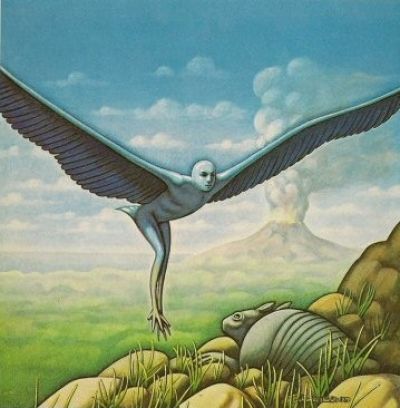Kit
Well, that was DEEPLY UNCOMFORTABLE. Because it’s grooming, more or less, with a side dose of romanticized sexual assault. The keeper even admits in the narration that it’s a crime, that you’re not supposed to do that to unconscious teenagers, but does it anyway. Initially I thought we were meant to disapprove of his behavior and I was drawing comparisons to Lolita where you’re seeing it through the eyes of the terrible person but aren’t meant to sympathize with them, but the end lets that theory out, since the youth comes back and purports to love the keeper and this seems to be portrayed as a good thing, and their planet at least isn’t dying? Or something? Their society sounds like it’s kinda terrible to live in under the best of circumstances. (The amount I can write about this is somewhat limited because I found this one seriously set off my mental health stuff– it cuts way too close to home– so that’s why this is shorter than mine usually are.)
Kris
Yeah, this was a very unpleasant read. I shared it with some other people just to make sure and one person got halfway through and needed to sit for a while to recover rather than to keep reading.
I can definitely understand why it has not been reprinted regularly. The consent and power dynamics do not read well at all, particularly with the end seeming to narratively justify all the unpleasantness.
I can only assume it was trying to be a piece exploring queer relationships and hit far wide of the intended mark.
Trying to put all of that to one side, what we are left with seems to be a kind of melancholic end of Earth kind of tale, fair but also not much there.
Overall, definitely not McIntyre’s best work. Pick up Dreamsnake instead!
Brian
The only experience with McIntyre I’ve had previously was the short story “Of Mist, and Grass, and Sand,” published the same year, and I think it would later form part of Dreamsnake but I could be wrong. McIntyre would win a Nebula in 1974, which is impressive considering she was a Young Person then, but it wasn’t for “Wings.”
I can’t say I was disturbed by this story. I was more… perplexed by it? It’s too far removed from actual human experience for me to relate to the two leads, and they were also characterized too abstractly to feel “human” as it were. The whole thing is written in this knowingly artful fashion, what with the keeper’s Shakespearian dialect, that at some point I more took it as a substitute for plot and character. The setting is desolate, no doubt apocalyptic, but the world as it used to be is only somewhat alluded to. Not to mention I don’t find the ray-of-hope ending to be all that earned, and as my fellow readers have pointed out, this story very much has that whiff of post-hippie questionable attitude towards adult-minor relations that seemed most prevalent in the ’70s.
I would say the tone, combined with the murky relationship at the center, reminds me of stuff by James Tiptree Jr. and John Varley from the same period, but Tiptree’s stories tend to be uncompromising in their pessimism, and Varley at this point in his career was at least fun to read first and foremost. I can see why “Wings” was published in an original anthology, because I don’t think the top magazine editors of the time (except maybe Edward Ferman) would’ve taken it.

